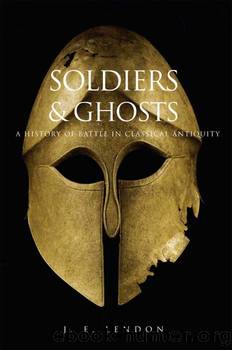Soldiers and Ghosts by J. E. Lendon

Author:J. E. Lendon [Lendon, J. E.]
Language: eng
Format: epub
ISBN: 978-0-300-12899-4
Publisher: Yale University Press
Published: 2005-06-15T00:00:00+00:00
Jerusalem during the Roman Siege (AD 70)
Now the legions came up, and Titus ordered them to camp around the city: the Tenthânot Caesarâs old Tenth, now called X Gemina, but X Fretensis, founded by Octavianâwas assigned the Mount of Olives. While the Tenth was fortifying its camp, the enemy unexpectedly struck against it from the city. After a confused struggle the legion was turned to flight but was rallied by Titus, who took the Jews in the flank with his personal guard. Having restored the situation, Titus established a protective line nearer the city and sent the Tenth back to build its camp. But the Jews thought the legionaries were fleeing and attacked again, and the forward Roman line collapsed before them, leaving Titus isolated with his companions on the slope. Now, and not for the last time in this war, Titusâs friends and staff begged him to take care: he was the general-inchief, not a soldier, they said. Everything depended on him, and he should not risk himself. This was the standard advice of Greek tactical writers and the principle to which Julius Caesar had adhered. But Titus was having none of it. He held his position, himself fighting by hand. In their eagerness to chase those in flight the enemy split around his small band like a torrent around a rock, and so Titus and his guard charged them in the flank. Once again the Tenth was in a panicâso much for Josephusâs âno disorder disperses them from their usual formation, no fear confounds themââand it began to flee, but then Titus was noticed in the fight on the slope below, and (Josephus says) pure shame at having abandoned their general rallied the legionaries, and they pushed the Jews back down the slope.13
With the legions encamped, the Romans turned to clearing the ground before Jerusalem, shifting their camps closer to the walls and bringing up the baggage. During this work, the defenders worked a ruse upon the besiegers. The Romans knew from defectors that the Jews inside the city were riven by religious and political faction and that some yearned to come to terms with Rome. So when a body of men appeared to have been ejected from the city amidst a shower of stones and appeared to be trying to force their way back in while cowering from the Romans who looked on, and when those who had expelled them shouted, âPeaceâ and offered to open the gates to the enemy, many Romans were deceived. Titus suspected a trick and ordered no move to be made, but the guards of the Roman works made a rush for the gates without orders. Now those who had pretended to be expelled attacked them in the rear, and now those who had promised to open the gates shot them down with missiles from the ramparts: only slowly and with great loss did the Romans fight their way free. The defenders jeered and capered on the walls.14
This was Titusâs Gergovia, and the sequel was the same as at Gergovia.
Download
This site does not store any files on its server. We only index and link to content provided by other sites. Please contact the content providers to delete copyright contents if any and email us, we'll remove relevant links or contents immediately.
The Daily Stoic by Holiday Ryan & Hanselman Stephen(3304)
The Fate of Rome: Climate, Disease, and the End of an Empire (The Princeton History of the Ancient World) by Kyle Harper(3056)
People of the Earth: An Introduction to World Prehistory by Dr. Brian Fagan & Nadia Durrani(2733)
Ancient Worlds by Michael Scott(2682)
Babylon's Ark by Lawrence Anthony(2673)
The Daily Stoic by Ryan Holiday & Stephen Hanselman(2572)
Foreign Devils on the Silk Road: The Search for the Lost Treasures of Central Asia by Peter Hopkirk(2463)
India's Ancient Past by R.S. Sharma(2451)
MOSES THE EGYPTIAN by Jan Assmann(2412)
The Complete Dead Sea Scrolls in English (7th Edition) (Penguin Classics) by Geza Vermes(2277)
The Earth Chronicles Handbook by Zecharia Sitchin(2227)
Lost Technologies of Ancient Egypt by Christopher Dunn(2223)
24 Hours in Ancient Rome by Philip Matyszak(2078)
Alexander the Great by Philip Freeman(2064)
Aztec by Gary Jennings(2023)
The Nine Waves of Creation by Carl Johan Calleman(1915)
Curse Tablets and Binding Spells from the Ancient World by Gager John G.;(1860)
Before Atlantis by Frank Joseph(1849)
Earthmare: The Lost Book of Wars by Cergat(1824)
